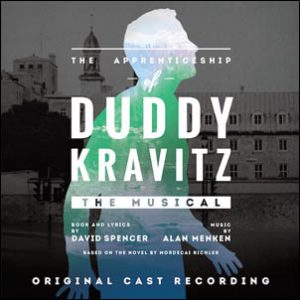

Hot off a successful run in Montreal, the original cast recording of The Apprenticeship of Duddy Kravitz tells the fascinating story of an ambitious young man who would seemingly stop at nothing to achieve his dreams.
Perhaps even more winding than its protagonist’s road to success is the show’s road to the Segal Centre for the Performing Arts. We sat down with David Spencer, who worked with Alan Menken to bring the story to life. He walked us through the challenges and wonders of bringing this show to Canada (and maybe beyond).
Could you tell me a little bit about the show, and the production in Montreal?
My first show was at The Public in 1984, I’d written an English adaptation of La Bohème. Right around that time, someone approached Alan Menken about Duddy Kravitz, and he thought that would be in my wheelhouse, so we started talking about it. We were eventually partnered with Austin Pendleton, who was then the librettist as well as the director. He had a co-librettist byline with Mordecai Richler [who wrote the book upon which the musical is based], who was alive and on hand at the time. They talked about stuff all the time, but really the hands-on writing was done by Austin. We went to the American Music Theatre Festival in Philadelphia. It was a terrific cast and a really noble try, but it didn’t quite work. Austin eventually got fired, though not by us.
I lobbied to take over as librettist, and after a lot of misadventures I was given the green light to do it. I tried very hard to do some kind of revisionist version of what we’d done in Philadelphia, because we wanted to preserve as much of the score as possible. But after a while, I just couldn’t make it work, and I realized I had to start from scratch. Of course, when you do that, and you come up with a new approach, and a new thematic center, what happens is that everything that doesn’t adhere to that has to go away. So, about three-quarters of the score that we had in Philadelphia went bye-bye. Basically, it became a new score. A new show with the same title.
We had many misadventures trying to get it on. Several readings — great when we were left alone to do our thing; and not-so-great when we bowed to pressures from a misguided producer and director, which taught me to never say 'yes' when I mean 'no', and I never have since. It's the hardest lesson to learn in show business, maybe in life, but it's also among the most necessary. Not only for the sake of the piece, but the sake of your soul. Stay open to good ideas? Yes, always. Compromise the piece for the sake of an opportunity? Never. Once you do that, the opportunity is poisoned anyway, so you gain nothing. But standing firm left us open to a kind of miracle: Through a series of serendipitous connections that are so insane that they still boggle my mind, we were connected with the Segal Centre. I'd gotten very hooked on a Canadian TV show called Republic of Doyle, set and filmed in St. John's, Newfoundland, which was not yet being broadcast in the States. Jonathan Monro [the musical director of Duddy Kravitz] is also an actor who had been in a pivotal episode and was told by one of his collaborators that I was a fan of the show. He approached me to ask how I was seeing it — a backdoor method is all I'll admit to here — and mentioned he was putting together a musical theatre concert for the Newfoundland Pops, in which he'd be headlining with another St. John's celebrity, Krystin Pellerin, who just happened to be a co-star of Doyle. With fanboy enthusiasm, I said, "Well I have stuff for Krystin to sing!" He asked, "What do you have?" I said, "I got The Apprenticeship of Duddy Kravitz, it doesn't get more Canadian than that." We sent her "How Could I Not?" which she loved; and he loved, and a few weeks later Jonathan asked for two more songs that Duddy sings, that he could perform; but both needed supporting character actor parts and he asked me if I'd come up to play them. So, comes the concert, we did three newly orchestrated songs in front of a full concert orchestra in a full auditorium. It was a rousing success, and off that experience, we started to talk about what we could do to get the show on. Next thing we knew, we were networking in the Canadian theatrical community.
That was one thread that started the ball rolling. Now the other thread was a whole other line of coincidences that began a few years before. There's a musical theater writer based in Montreal named Elan Kunin. I’d written a book called The Musical Theatre Writer’s Survival Guide, that his wife had seen in the store and bought for him; and after reading it, he contacted me on Facebook to ask a few questions about what he'd read. Over the course of about two years, periodically we would chat on Facebook about writing musicals. Right around the time that Jonathan and I started networking Duddy, I was typing with Elan, still in Montreal, telling him what we were doing. He suggested that the Segal Centre would be perfect for the show, and wide open to it. I asked him how he was so sure they'd say yes and he typed back: "Because my wife runs the theatre." Sure enough, she was interested. He had recently had his own show produced at the Segal, also based on a Canadian classic, called Lies My Father Told Me. And a remounting of the show came to New York for a limited run at Baruch. Morning of the first preview, he called me all excited and said "She's here! Do you want to meet her?" His wife had flown in to surprise him, to be there for the premiere performance. Of course I said yes.
And that's how I met with Lisa Rubin, the brilliant and resourceful artistic and executive director of the Segal Center, at a little Thai restaurant on 9th Avenue. It was one of those great meetings that doesn't happen often; where you meet somebody and know instantly that you’re not only in sync, but in very good, capable hands, and you don’t have to test it. You feel like you know them and they know you; you just get each other. She wanted to do Duddy; that simple. She was as big a Broadway fangirl as I was a Canadian TV fanboy, so when I asked if Austin could direct it, she looked at me like I was crazy to even wonder, and she said yes. So basically, if she hadn't bought her husband my book, and I hadn't been a fan of a Canadian private eye TV show, Duddy in Montreal never would have happened. The only sense I can make of it, putting aside karma, is that when you share enthusiasms and good will, you give serendipity an environment in which to flourish.
 That sounds incredible. It’s a winding road, but what an amazing story! If we could go back to the beginning of it all, what first drew you to this book and this story?
That sounds incredible. It’s a winding road, but what an amazing story! If we could go back to the beginning of it all, what first drew you to this book and this story?
I have found that oftentimes when a project is brought to me, it’s not always oh gosh I have to do this. It’s sometimes the challenge of it, because I knew what other writers had faced. Ours was not the first adaptation. There was a Canadian version prior to ours, and their songwriters were fired. We came on with the understanding that it was going to be an entirely new adaptation. Ours was the second version. Mine was the third book. There were little gaps and misadventures. There was a brief period where we didn’t have the rights, and there was a Yiddish version. Then we got the rights back, and more misadventures eventually led us to Canada.
When it was first thrown at me, I knew I understood the language and the characters – up to a point, in terms of them being urban Jewish characters. More was understanding the Canadian sensibility, which I didn’t have in me at the time. That was something I had to learn. But, it was more about how do I crack this? The challenge of it was the first thing that got me into it. Really caring about it happened a little bit of the way in. I knew I would care about it, but sometimes it’s really just that somebody threw a challenge at you. The story is very complex, it has an element of serious darkness to it, but it’s also very funny. It was just the challenge of finding a structure, and a way to make a morally ambiguous character empathetic, and to some degree sympathetic.
He’s definitely a very compelling protagonist. Do you have any future plans for the show?
We are talking with people about future productions now, which is not necessarily indicating that anything is definite yet. I’d love to have it done in New York. I’m hoping that the album is going to help. It’s been around for a while, and I think that up until the advent of the Canadian production that we had in Montreal, there was a sense that it had been shopped and shopped. When we did get to that production in Montreal, it found a new life and a new buzz. We sold out and extended twice. We came back with a kind of a new and refreshed life.
The Apprenticeship of Duddy Kravitz is out now on Ghostlight Records. To order, visit sh-k-boom.com/duddykravitz